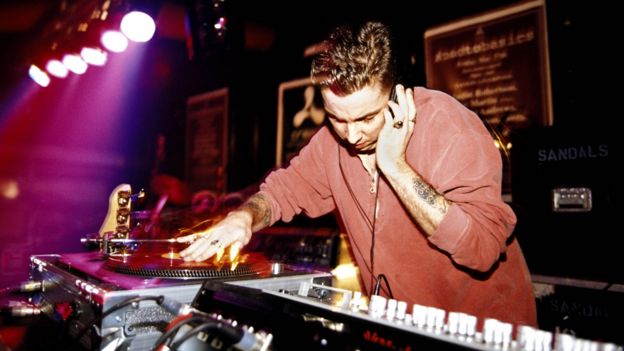Andrew Weatherall, one of the UK’s most respected DJs and record producers, has died aged 56.
The musician, who was born in Windsor, rose to fame during the acid house era, and worked with the likes of New Order and Happy Mondays.
His production and remix work on Primal Scream’s Screamadelica turned it into an era-defining album, and earned the band the first Mercury Prize in 1992.
Weatherall died in hospital on Monday morning, his spokesman confirmed.
The cause of death was a pulmonary embolism.
“He was being treated in hospital but unfortunately the blood clot reached his heart. His death was swift and peaceful,” said a statement.
“His family and friends are profoundly saddened by his death and are taking time to gather their thoughts.”
The musician started his career singing with post-punk bands at his local arts centre – but found his feet as a DJ in the late 1980s.
“I saved up all my money and went to London at the weekend to buy records,” he told the BBC in 2014. “I just got a really good record collection together to the point where people started to say ‘Why don’t you play this at our party?’, ‘Why don’t you play this at our club?'”
When the acid house scene started to develop around the Roundshaw Estate in Sutton, he discovered that club nights were playing a lot of the music he already owned.
“I knew I had records as good as that, or even better, that they might not know,” he later explained, adding: “I was kind of in the right place at the right time”.
As the scene exploded, Weatherall was invited to play at the London nightclub Shoom by DJ Danny Rampling, and helped document rave culture with the fanzine Boys Own – a name he later gave to his own record label.
His DJ career led to Weatherall remixing New Order’s Worlds in Motion and, along with Paul Oakenfold, the Happy Mondays’ Hallelujah.
As a result, he was sought out by Primal Scream, who asked him to remix their single I’m Losing More Than I’ll Ever Have for the meagre sum of £500.
After an initial attempt on which he “basically slung a kick drum under the original”, Weatherall decided to try a much more radical approach.
The result was Loaded, which retained about seven seconds of Primal Scream’s song – the bass line and a slide guitar.
Weatherall added vocal samples from the US soul group The Emotions, a drum loop from an Italian bootleg of Edie Brickell’s song What I Am, alongside snatches of other Primal Scream songs, and frontman Bobby Gillespie singing a line from Robert Johnson’s Terraplane Blues.
Gillespie saw Loaded as being part of the Jamaican tradition of dub records, where songs are deconstructed at the mixing desk, adding new elements and desecrating existing ones.
It propelled the rock band onto the dance floor, and kick-started their career.
“I think it’s time to stop saying ‘this is a dance record’ and ‘this is a rock record,'” said Gillespie at the time. “If you can play music, you can do whatever you want. Just use your imagination.”
The success of Loaded led to Weatherall being recruited for the whole of Screamadelica, establishing him as one of the UK’s most in-demand producers.
 I
I
While remixing acts like St Etienne, Beth Orton and My Bloody Valentine, he also held down a DJ slot on London’s Kiss FM and ran two club nights in London.
However, he never became a household name like his contemporaries Paul Oakenfold and Fatboy Slim – a career move that was entirely deliberate.
“That sort of carry-on was never for me,” he told the Independent in 2016. “It’s a lot of work, once you go up that slippery showbiz pole, and it would keep me away from what I like, which is making things.”
Instead, he carved out a career on the cutting edge of techno, with projects including Sabres of Paradise and Two Lone Swordsmen.
‘Titan of music’
In 2017, he explained the lure of the dancefloor in an interview with Uncut magazine.
“It’s the enduring appeal of transcendent experience, which has been with us for 200,000 years. A room, coloured lights, smoke and music? Over to you, Roman Catholics. There are ancient Greek rituals involving herbal drugs to achieve transcendence.
“People were having transcendent experiences in 1940s dancehalls, dancing to a big band; now we do it with drum machines and electronic technology – it’s the same concept. Humanity hasn’t changed for 100,000 years, but our technology has.”
Musicians paying tribute to Weatherall included Ride guitarist and former Oasis bassist Andy Bell, who described him as “absolute titan of music”.
BBC 6 Music DJ Giles Peterson said it was “hard to put into words” the “influence and impact he has had has had on UK culture.”
Hacienda DJ and author Dave Haslam tweeted he was “one of the greatest, sweetest, funniest guys I’ve ever met”.
And Tim Burgess from The Charlatans wrote he was “shocked and saddened to hear that cosmic traveller Andrew Weatherall has left the building”.



